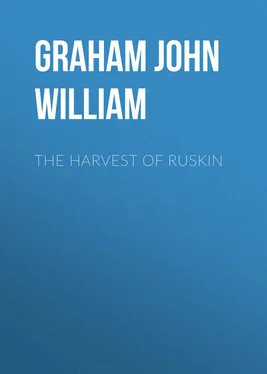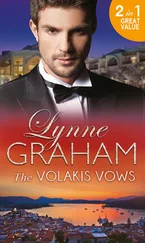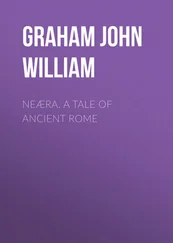John Graham - The Harvest of Ruskin
Здесь есть возможность читать онлайн «John Graham - The Harvest of Ruskin» — ознакомительный отрывок электронной книги совершенно бесплатно, а после прочтения отрывка купить полную версию. В некоторых случаях можно слушать аудио, скачать через торрент в формате fb2 и присутствует краткое содержание. Жанр: literature_19, foreign_antique, foreign_prose, на английском языке. Описание произведения, (предисловие) а так же отзывы посетителей доступны на портале библиотеки ЛибКат.
- Название:The Harvest of Ruskin
- Автор:
- Жанр:
- Год:неизвестен
- ISBN:нет данных
- Рейтинг книги:5 / 5. Голосов: 1
-
Избранное:Добавить в избранное
- Отзывы:
-
Ваша оценка:
- 100
- 1
- 2
- 3
- 4
- 5
The Harvest of Ruskin: краткое содержание, описание и аннотация
Предлагаем к чтению аннотацию, описание, краткое содержание или предисловие (зависит от того, что написал сам автор книги «The Harvest of Ruskin»). Если вы не нашли необходимую информацию о книге — напишите в комментариях, мы постараемся отыскать её.
The Harvest of Ruskin — читать онлайн ознакомительный отрывок
Ниже представлен текст книги, разбитый по страницам. Система сохранения места последней прочитанной страницы, позволяет с удобством читать онлайн бесплатно книгу «The Harvest of Ruskin», без необходимости каждый раз заново искать на чём Вы остановились. Поставьте закладку, и сможете в любой момент перейти на страницу, на которой закончили чтение.
Интервал:
Закладка:
If we omit the Poems of his boyhood and youth, and his early minor scientific contributions to journals, and begin his career as a writer for the public with the year 1842, when he wrote the first volume of Modern Painters , published next year, we have sixteen years of authorship for the Early Period. We have also, oddly enough, sixteen years of authorship, 1858 to 1874, for his Middle Period, shortly to be described; and if we give sixteen years for the mature period also, that brings us to 1890, only a few months after the last number of Præterita struggled into the light from his failing pen. He wrote no more. We thus have three periods, Early, Middle, and Mature, each of sixteen years, not difficult to remember, 1842-1858, 1858-1874, and 1874-1890. It is a testimony to his utter frankness and undimmed candour that we are able thus to map out the growth of his convictions.
For a growth it was, all the time, though apparently 1858 was a year of wreck and ruin. We cannot put new wine into old wineskins. His middle period was the time for the analytical tendency of his mind to have its way. Mazzini had already said that Ruskin had the most analytic mind in Europe; and now that searching analysis which had discovered Luini and placed Tintoretto, and had penetrated, by a way of its own, far into the hidden secret of Beauty, could not be denied when it faced the stronghold of the Christian revelation, even though his own heart and every fibre of his sensitive nature was within the fortress attacked.
His economic crusade began in 1860; and on his spiritually desolated heart was piled the sorrow of the social system. Hermit and heretic he became, in religion and economics alike. Victorious in his championship of Turner and the Pre-raphaelites, whom single-handed he had placed on the pinnacle they have never lost, he had the literary and artistic world at his feet. This great position he cast aside to enter on a sterner battle. The recognized leader of taste, the arbiter of reputations, turned aside to abuse so good a man as John Stuart Mill, to say the most shocking things about the clergy and the clergy’s wives, to testify against rent and interest, to blaspheme that steam power by which England was conquering the world, and to utter strange hesitating sayings which showed that he was not sure of a life to come. Nor could he brave the storm with the self-confident dogmatism of youth. “I seldom now feel sure of anything,” he wrote in the first Christmas issue of Fors , “still seldomer, however, do I feel sure of the contrary of anything.” 13 13 Letter XII, p. 3.
When we add that this period was marked by the loss of his parents, who had been everything to him, and by a grievous disappointment in love – for the girl who loved him would not marry him because he was not orthodox, so far as reasons can ever be given for such decisions, but died of a decline instead – we shall see how heavy was the lonely task set before him to do. Nor had the veneration of disciples and the growing recognition of all good men come to him yet; it came afterwards, built the prophet’s shrine, in his lifetime certainly, 14 14 Notably in the address and Turner drawing presented by distinguished men on his 80th birthday.
but only after the world’s neglect, and his failure even to carry his own friends with him, had helped to break the powers of his mind and set his brain reeling in recurring attacks of delirious inflammation. He was, in that madness, being offered upon the sacrifice and service of our faith.
During this middle period of prime mental power, he wrote nineteen volumes, and numerous catalogues and pamphlets. They are, in order of time: The Two Paths , Modern Painters , vol. v., Unto This Last , Munera Pulveris , Sesame and Lilies , The Ethics of the Dust , The Crown of Wild Olive , Time and Tide , The Queen of the Air , Lectures on Art at Oxford , the first half of Flors Clavigera , Aratra Pentelici , The Eagle’s Nest , Love’s Meinie , Ariadne Florentina , Val D’Arno , and most of the papers reprinted in On the Old Road . As an author he was in his full strength.
The significance of the period is that under the most painful uncertainties of doctrine, true religion shone still, blazed beaconlike, in fact: blazed as a beacon blazes when blown by tempest. But few readers ever thought of the writer as a heretic. He preached all the time the simple eternal sanction for right conduct which the nature of man, akin to the Divine, provides. He recognized the ineradicable claim which the teaching of the New Testament has upon our obedience. He attacked the Churches, not for being too Christian, but for not being anything like Christian enough. Referring to his mother’s gift of twenty-six chapters learnt by heart, he says in 1874: —
“The chapters became, indeed, strictly conclusive and protective to me in all modes of thought; and the body of divinity they contain, acceptable through all fear or doubt; nor, through any fear or doubt or fault have I ever lost my loyalty to them, nor betrayed the first command in the one I was made to repeat oftenest: ‘Let not Mercy and Truth forsake thee.’ And at my present age of fifty-five, in spite of some enlarged observations of what modern philosophers call the Reign of Law, I perceive more distinctly than ever the Reign of a Spirit of Mercy and Truth – infinite in pardon and purification for its wandering and faultful children, who have yet Love in their hearts; and altogether adverse and implacable to its perverse and lying enemies, who have resolute hatred in their hearts, and resolute falsehood on their lips.” 15 15 Fors , Letter XLII.
The classical passage, as I should esteem it, for this period is in The Eagle’s Nest , 16 16 Pp. 189-190.
the Oxford Lectures of 1872; which contain some of his most careful religious writing:
“All of you who have ever read your Gospels carefully must have wondered sometimes, what could be the meaning of those words, ‘If any speak against the Son of Man it shall be forgiven; but if against the Holy Spirit it shall not be forgiven, neither in this world nor in the next.’ The passage may have many meanings which I do not know; but one meaning I know positively, and I tell you so just as frankly as I would that I knew the meaning of a verse in Homer. Those of you who still go to Chapel say every day your creed; and, I suppose, too often, less and less every day believing it. Now, you may cease to believe two articles of it, and – admitting Christianity to be true – still be forgiven. But I can tell you, you must not cease to believe the third!
“You begin by saying that you believe in an Almighty Father. Well, you may entirely lose the sense of that Fatherhood and yet be forgiven.
“You go on to say that you believe in a Saviour Son. You may entirely lose the sense of that Sonship and yet be forgiven.
“But the third article – disbelieve if you dare! ‘I believe in the Holy Ghost, the Lord and Giver of Life.’ Disbelieve that! and your own being is degraded into the state of dust driven by the wind; and the elements of dissolution have entered your very heart and soul.
“All Nature, with one voice – with one glory – is set to teach you reverence for the life communicated to you from the Father of Spirits. The song of birds, and their plumage, the scent of flowers, their colour, their very existence, are in direct connection with the mystery of that communicated life: and all the strength, and all the arts of men, are measured by and founded upon their reverence for the passion, and their guardianship of the purity, of Love.”
Читать дальшеИнтервал:
Закладка:
Похожие книги на «The Harvest of Ruskin»
Представляем Вашему вниманию похожие книги на «The Harvest of Ruskin» списком для выбора. Мы отобрали схожую по названию и смыслу литературу в надежде предоставить читателям больше вариантов отыскать новые, интересные, ещё непрочитанные произведения.
Обсуждение, отзывы о книге «The Harvest of Ruskin» и просто собственные мнения читателей. Оставьте ваши комментарии, напишите, что Вы думаете о произведении, его смысле или главных героях. Укажите что конкретно понравилось, а что нет, и почему Вы так считаете.












